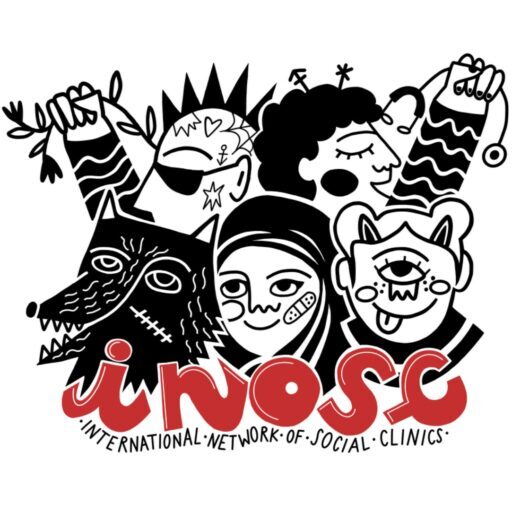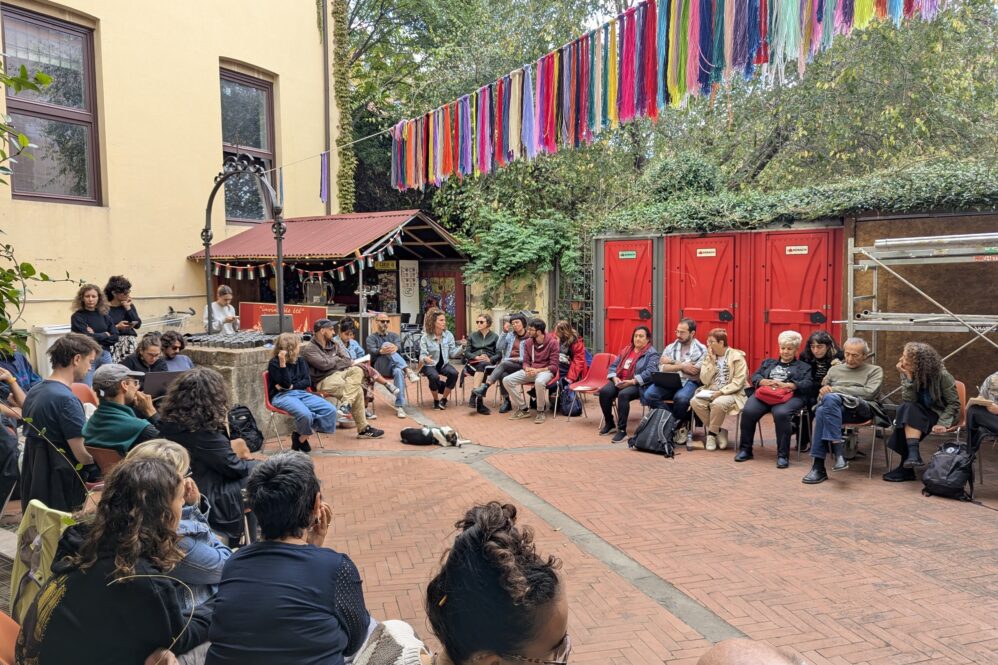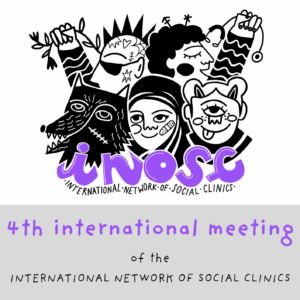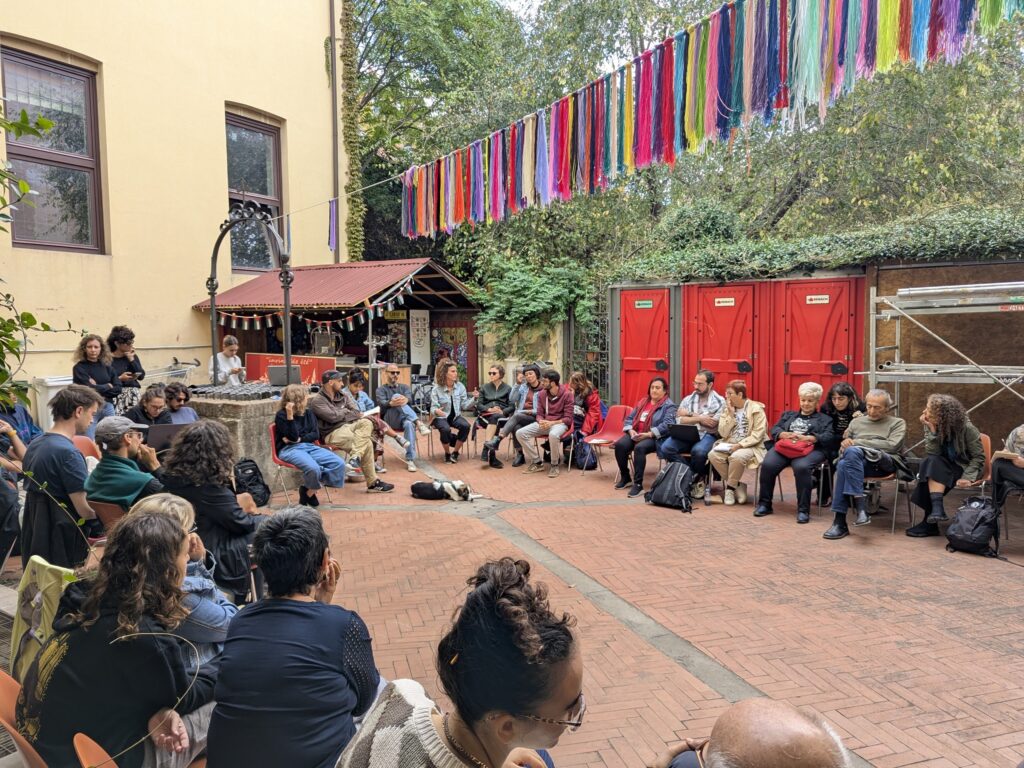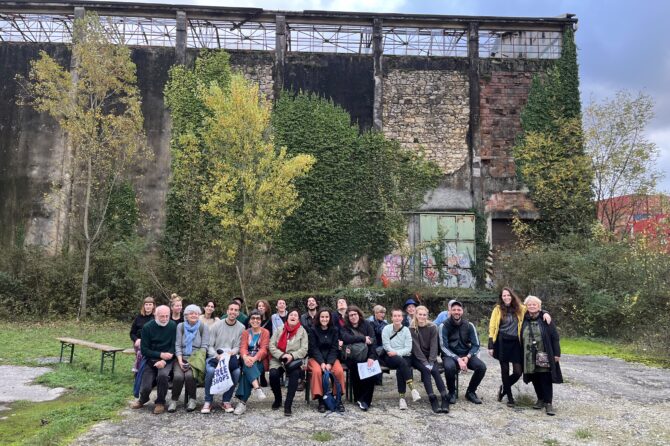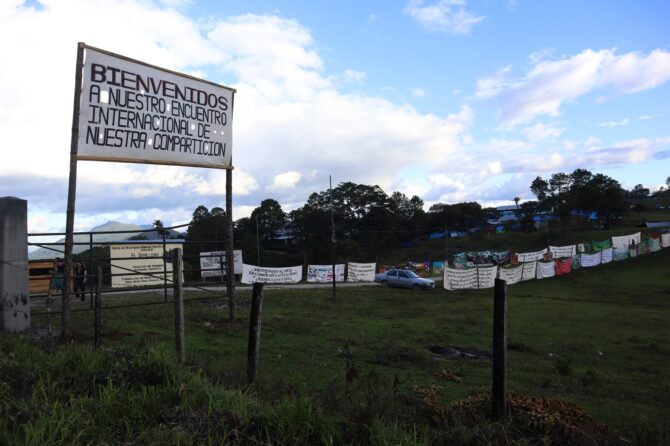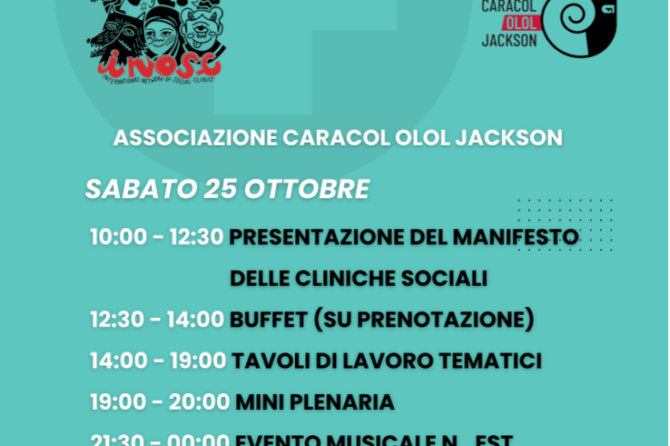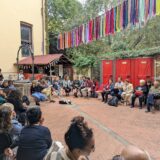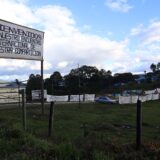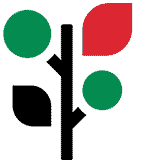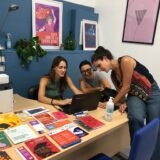Download full report PDF here
Summary
The 4th International INOSC Meeting brought together 15 social clinics and collectives from across Europe for three days of exchange, political discussion, and collective strategising. Hosted in Bologna, the gathering demonstrated the network’s continued growth and deepening collaboration, while revealing both shared challenges and productive tensions around political strategy and relationships to state institutions.
Day 1: Clinic Updates and Shared Challenges
The opening session featured presentations from clinics spanning Greece, Germany, France, Italy, and Spain, representing diverse contexts from established urban initiatives to emerging rural projects. Participating collectives included long-standing clinics like Microclinica Fatih (active since 2009) and KIA (Thessaloniki), national networks like Poliklinik Syndicat (coordinating 15 German clinics), and newer initiatives still seeking permanent spaces.
Key themes emerging from clinic updates included the growing emphasis on mental health provision and peer support, efforts to challenge medical hierarchies through transfeminist and demedicalized approaches, deep integration with broader social movements (housing struggles, anti-fascist organising, environmental campaigns), and increasingly interdisciplinary teams combining medical, psychological, and social support.
Critical discussions revealed common challenges facing the network: navigating medical complicity in migration control systems (particularly around certificates for detention and deportation), maintaining funding autonomy while addressing “corporate washing” concerns, addressing organisational sustainability as clinics scale up, and the striking reality that clinics initially established for undocumented migrants now increasingly serve citizens excluded from collapsing public healthcare systems.
Day 2: Political Tensions and Strategic Questions
The morning session examined healthcare professionals’ roles in migration control, revealing a disturbing European pattern: governments initially allow medical professionals some autonomy in certification, then progressively restrict who can write certificates and under what conditions, ultimately centralising power with state-appointed doctors. Presentations from Germany, France, and Greece mapped how medical authority is instrumentalised beyond health needs—from detention authorisation to permission for Muslim women to wear veils in public spaces.
The session drew connections between migration control and broader welfare state collapse, with one participant noting that “the only answer the state has to social problems is militarisation, privatisation and war on society.” The Network Against Administrative Detention presented on transnational organising against the expansion of detention centres and deportations to Albania, drawing explicit links between Israeli repression of Palestinians and violence against people on migratory routes.
The afternoon session explored fundamental questions about community, self-management, and collective identity. Participants grappled honestly with persistent power differentials between care providers and recipients, with one collective member articulating: “We live in a contradiction and that’s our starting point. But we need to start and move on.”
The most significant tension emerged around political horizons: some clinics expressed a wish “to make ourselves obsolete” by pushing for better state healthcare provision, while others insisted “we’re building the day after. We don’t want the state to do what we do. We want to manage it ourselves.” Rather than forcing consensus, the network affirmed that “it’s okay to remain different in our approaches,” suggesting that INOSC’s strength may lie in holding productive tensions rather than demanding uniform political positions.
Moving Forward
The Bologna meeting succeeded in deepening relationships while making visible the political and strategic differences within INOSC. Participants described themselves not as friends or comrades but as “co-strugglers”—bound by mutual recognition, shared antagonists (state repression, border regimes, neoliberal healthcare), and commitment to autonomous organising, while maintaining distinct approaches to state institutions and ultimate political goals.
The meeting demonstrated INOSC’s maturation as a network capable of sustaining disagreement alongside solidarity, privileging collective discussion over individual presentations, and treating intensive dialogue as necessary labour for building transnational collaboration. As the network continues growing—with the next international meeting planned for Hamburg, Germany in June 2026—the challenge remains translating mutual recognition and occasional gatherings into sustained coordination on campaigns, resource sharing, and collective resistance to the militarisation and privatisation reshaping European healthcare.
Full report:
4th International Meeting of the International Network of Social Clinics
Bologna, Italy | 26-28 September 2025
Day 1: Friday 26 September 2025
Session: Introducing New Social Clinics + Updates from the Past Year
This opening session provided an opportunity for participating clinics and collectives to share significant developments, challenges, and achievements from the past year. Each clinic presented for approximately 10 minutes, followed by clarifying questions and open floor discussion.
Overview of Participating Clinics
The session featured presentations from 15 social clinics and collectives across Europe, representing diverse contexts from established urban clinics to emerging initiatives in rural areas. The geographic span included Greece, Germany, France, Italy, and other European countries, demonstrating the growing breadth of the INOSC network.
Microclinica Fatih (Turin, Italy) has expanded from supporting people with migratory backgrounds to addressing homelessness and mental health needs, developing peer-led support groups and campaigns against medical violence through a transfeminist consultoria.
KIA (Thessaloniki, Greece) reported fundraising concerts, collaboration with music groups in North Macedonia, medical support at Palestine solidarity events, visits to refugee camps in Athens, and efforts to make their space more welcoming while increasing visibility at demonstrations.
V2S (Échirolles, France), in its ninth year with 18 members, is restructuring its self-managed approach to address workload challenges, expanding physical space, organising a housing and health group with neighbours, and participating in a national experimentation (SECPA) for clinic development.
Poliklinik Syndicat (Germany) represents a national network of 15 different clinics that meet biannually, working on a major funding proposal for community-based healthcare and seeking to extend provision to rural areas.
LSP (Bologna, Italy) developed within municipal social centres as part of broader social and political projects initially focused on housing, offering psychological, gynaecological, dental, and general medical care while conducting grassroots data collection on social and health needs.
Brigata Basaglia (Italy) operates across five cities (Milan, Turin, Florence, Perugia, Bologna) providing individual psychological and social support, supporting groups and collectives, organising community activities against psychiatric violence, running art and theatre laboratories, and hosting an annual three-day festival called “Contatto.”
Zero81 – Laboratorio di Mutuo Soccorso (Napoli, Italy), born in 2013 in a political squat, focuses on prevention, sexual and reproductive health support from a transfeminist perspective (including IVG support and mapping services), and psychological orientation toward public services.
Freiburg (Germany), composed of nurses, social workers, and doctors, is seeking a permanent space while focusing on social and health consultation in a specific district and networking with local groups; they have secured their first paid position.
Göttingen (Germany) is fighting with the city for space (their bid was rejected due to political concerns), continuing weekly health and social counselling, and working with local associations supporting migrants and outskirts communities through Medinect.
Jena (Germany), in former East Germany with significant fascist presence, faces room challenges due to student numbers but continues weekly health and social counselling while building community with incomers and considering sustainability without paid staff.
Geko (Berlin, Germany) provides multiprofessional services and space for self-organised groups, responding to increased violence against Muslim communities since October 7th by creating solidarity actions and safe spaces.
Poliklinik – Solidarisches Gesundheitszentrum Leipzig (Germany) expanded into a larger space, developing interdisciplinary approaches inspired by KIA with two-professional consultations, adding social and occupational therapy counselling, sharing space with organisations providing fake identities and legal advice, and running self-help groups, reproductive health services, and children’s homework support.
Entrar Afuera (Spain) works as both a research collective and within the public healthcare system, with three members in a healthcare centre that secured cultural ministry funding for community activities including conflict management workshops, radio projects, and incorporating peer support workers in mental health.
Clinica Popolare Azadî (Padova, Italy), a social clinic with psychologists and doctors, provides 8-10 session psychological support, works with Open Gates association for migrants, runs photovoice projects and self-help groups for chronic pain, and fundraises to offer lower-cost alternatives to the burned-out Italian NHS.
Poliklinik Veddel (Hamburg, Germany) has grown over 10 years to 40 people, integrating primary healthcare, health promotion, and community work with six GPs, social and health counselling, psychological services, community health nurses, midwives, and a research team in a working-class district with city support.
Ambulatorio Popolare Caracol Olol Jackson (Vicenza, Italy) offers dental care, needs assessment, psychology, and primary care alongside cultural activities, hosts a grassroots union, works on anti-labour and sexual trafficking, runs a food bank, issues temporary healthcare codes (tessere STP) for undocumented people, coordinates with local authorities on severe marginalisation, and supports anti-TAV campaigns.
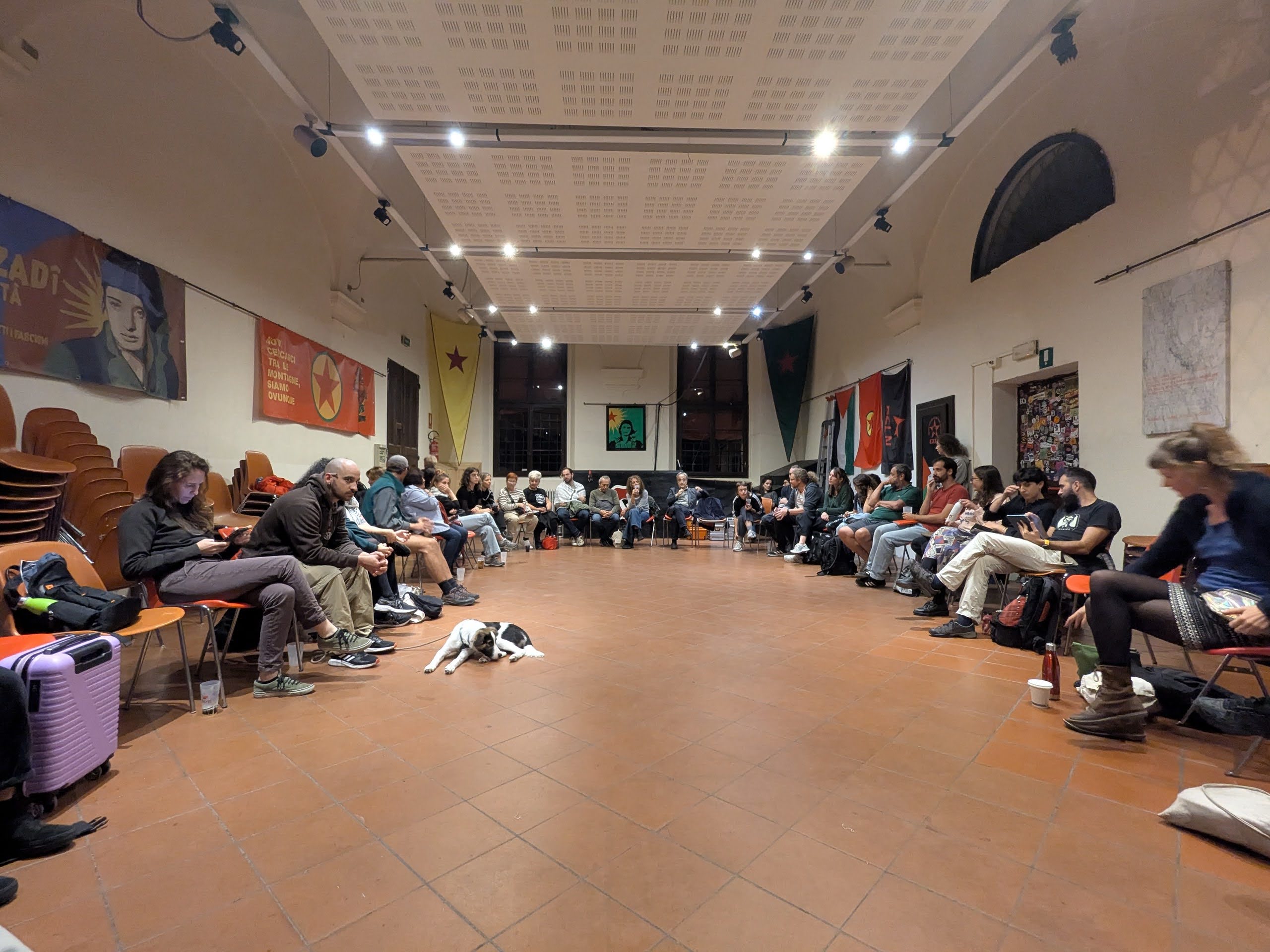
Key Themes and Innovations
Challenging hierarchies and medical power: Multiple clinics reported developing practices to address power imbalances in healthcare. Microclinica Fatih explicitly questioned “the power of medical knowledge” and developed working teams with significant networks to change hierarchies between care professionals and service users. This emphasis on demedicalization appeared in several presentations, including Napoli 081’s work on sexual and reproductive health carried out by non-medical professionals from a transfeminist perspective.
Mental health provision and peer support: Mental health emerged as a significant and growing area of work. Brigata Basaglia provides individual psychological support, social support, support for groups and collectives (such as the GKN factory occupation), and organises community activities against psychiatric violence at hospitals. Several clinics reported developing peer support and self-help groups, with Microclinica Fatih noting that their self-managed mental health group emerged directly from demand by people experiencing mental health problems.
Integration with broader social struggles: Many clinics emphasised their embeddedness within wider social movements and occupied spaces. LSP in Bologna developed within municipal social centres as part of broader social and political projects initially focused on housing, from which sensitivity to healthcare access emerged. Caracol hosts a grassroots union, works on anti-labour and sexual trafficking, runs a food bank, and supports anti-TAV (high-speed rail) campaigns. Several German clinics described their origins in the shift from anti-globalisation politics (Seattle, Genoa) toward neighbourhood-based organising addressing local issues like housing.
Interdisciplinary and multiprofessional approaches: Clinics increasingly work with diverse professional teams including GPs, specialists, nurses, social workers, psychologists, occupational therapists, and midwives. Veddel in Hamburg has grown to 40 people over 10 years, integrating primary healthcare, health promotion, and community work. Entrar Afuera works both within the Spanish public health system and as a research collective, with three members employed in a healthcare centre that has secured funding for cultural activities including conflict management workshops, radio projects with high schools and feminist and Roma collectives, and incorporating peer support workers in mental health.
Support for migrant communities: Work with migrants and refugees featured prominently, from KIA’s refugee camp visits to Azadi’s partnership with Open Gates (an association for incoming migrants) to Caracol’s issuance of temporary healthcare codes (tessere STP) that enable undocumented people to access public health services. Several clinics reported increasing Islamophobia and violence against Muslim communities, particularly since October 7th, prompting reflection on how political clinics can be and how to create safe spaces without reproducing racism.
Prevention and health promotion: While responding to acute needs, several clinics emphasised preventive approaches. Napoli 081 focused on prevention from its 2013 inception (paused during COVID), and Caracol runs a prevention project involving over 50 people. Leipzig works on community organising to ensure health knowledge is free and accessible in the most remote and marginalised areas.
Critical Discussions
The open floor discussion highlighted several tensions and strategic questions facing social clinics:
Medical certificates and state control: An extensive discussion emerged around doctors’ roles in producing medical certificates related to migration control. Microclinica Fatih proposed a campaign for doctors to refuse signing approvals for migrant internment in detention centres, arguing that incarceration is pathogenic.
Poliklinik – Solidarisches Gesundheitszentrum Leipzig described the evolution of German policy on deportation certificates: initially, GPs could write certificates stating migrants had experienced trauma during their journey; the government then restricted this to psychiatrists and required multiple sessions; now only court psychiatrists can make determinations, often in five-minute consultations contradicting the previous requirement for longitudinal assessment. Clinics are now exploring certificates stating that conditions cannot be treated in deportation destination countries.
V2S noted similar dynamics in France, where certificates are required for asylum claims based on vulnerability and for prisoners to access basic items like pillows and sunglasses, raising questions about “what role do we give to medical power.” The discussion highlighted how clinics navigate complicity with state control while trying to protect vulnerable people.
Funding and autonomy: Poliklinik Syndicat described their fragmented funding model including movement foundations, private foundations, and crowdfunding, with only three paid positions supported by donations. They acknowledged the challenges of “corporate washing” when accepting certain funding sources. Other clinics reported various approaches including grants, crowdfunding, donations, and in some cases public funding (Veddel receives city support, Entrar Afuera secured cultural ministry funding).
From migrant support to broader accessibility crisis: A striking theme was how clinics initially established to support undocumented migrants increasingly serve citizens struggling to access public healthcare. Azadi from Padova stated bluntly: “The Italian healthcare system is in burnout. It doesn’t provide enough support, nobody receives the care they need, everyone is overworked.” This shift raises questions about the role of social clinics in relation to public health systems – are they filling gaps that should be met by the state, or building alternative models?
Organisational sustainability: Several clinics discussed challenges of scaling up and maintaining staff, activists and collaborators’ energy. V2S is restructuring from collective work into smaller working groups to address burnout after a doctor’s departure. Jena questioned “if we can continue without being employed”. Caracol acknowledged the chaos of coordinating over 50 people taking shifts, with resulting challenges in maintaining proper medical records.
Historical connections and political foundations: KIA emphasised that “the foundation of society is the history of social politics, not the politics of government but what we do, what movements do.” A participant asked about connections between contemporary social clinics and solidarity circles active 20-30 years ago in Greece, and whether there were links to student movements and occupations in Italy. LSP responded that their clinic developed within a broader social and political project initially focused on housing, from which healthcare concerns emerged.
Closing Observations
The session concluded with recognition of the diversity of approaches, contexts, and developmental stages within the network, while identifying common challenges around funding, state relations, sustainability, and the tension between meeting immediate needs and building transformative healthcare alternatives.
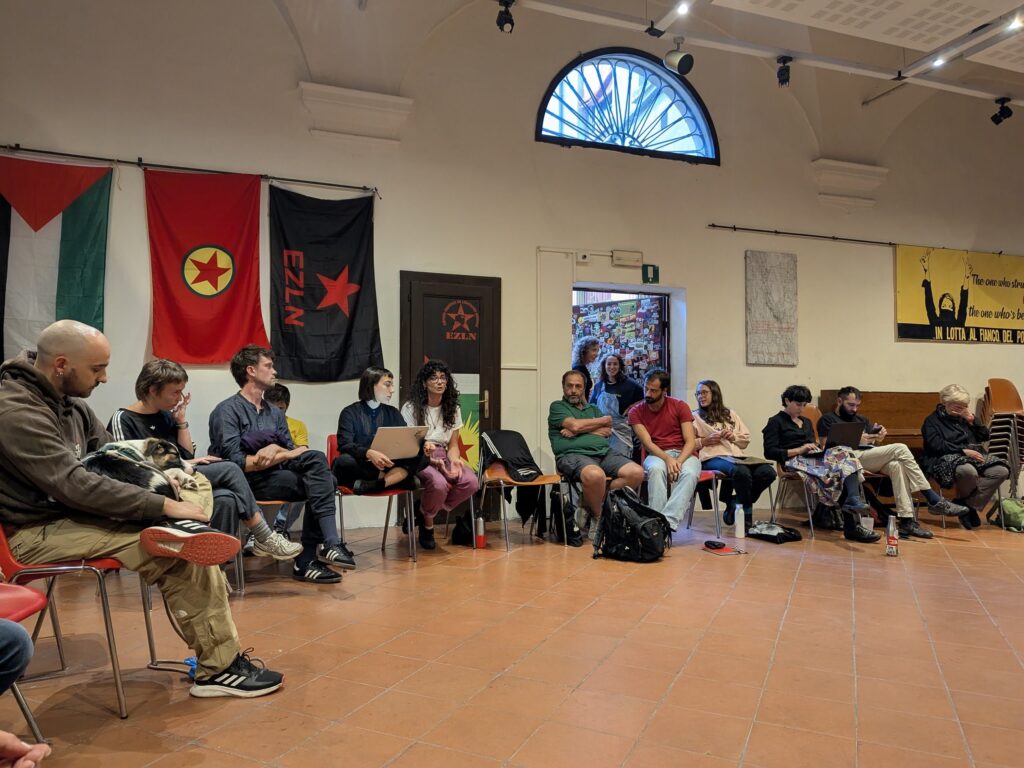
Day 2: Saturday 27 September 2025 – Morning Session
Migration, Militarisation & Practices of Resistance
This session examined healthcare professionals’ roles in confronting migrant repression, state militarisation, and the everyday realities of clinical work with migrant communities. The discussion revealed how healthcare workers are increasingly positioned as gatekeepers in migration control systems, while also exploring forms of resistance and solidarity practices.
Part 1: Complicity and Resistance – Mapping the Terrain
The session opened with case presentations illustrating how healthcare professionals are compelled to participate in migration control across different European contexts.
Medical certification and deportation systems: Multiple clinics described the evolving role of medical certificates in deportation processes. Leipzig detailed the German trajectory: initially, GPs could write notes stating migrants had experienced trauma to prevent deportation; the government then restricted this to psychiatrists requiring six months of consultation; finally, the system changed so only court doctors can determine trauma status, often in five-minute assessments contradicting the previous requirement for longitudinal evaluation. Clinics are now exploring certificates stating that conditions cannot be treated in deportation destination countries.
Geko confirmed that German GPs retain the right to write papers for people at risk of deportation, and they have successfully prevented deportation in at least one case. They noted that similar documentation is requested for minors in Greece.
V2S described how in France, medical certificates are required to guarantee asylum for vulnerable people, but also for seemingly minor issues like prisoners accessing pillows and sunglasses, or Muslim women obtaining permission to wear veils in public spaces. This raised fundamental questions about “what role do we give to medical power” when it becomes a tool of state control.
Detention centre authorisations: Microclinica presented the requirement in their context for doctors’ signatures to authorise incarceration in detention centres. They proposed developing a campaign for doctors to refuse these signatures on the basis that incarceration itself is pathogenic.
Transnational detention and deportation systems: The Network Against Administrative Detention, an internationalist project supporting freedom of movement, described collaboration with LSP at the Bosnian border providing sanitary knowledge and supporting resistance to violence. Formed 1.5-2 years ago by Italian associations, the network opposes the Meloni government’s expansion of detention centres (increasing both numbers and duration of stays) and the deportation of migrants to Albania with detention camps outside Italian borders. The network organised a European demonstration in Albania with participants from multiple countries and drew connections between Israeli repression of Palestinians and violence against people on migratory routes.
Greek detention conditions: KIA presented on actions against state repression, focusing on the Syntiki camp which functions as both an identification and detention centre. When people attempted to escape, many were hospitalised for malnutrition then recaptured. A large demonstration highlighted the inhuman conditions, prompting police officers to request special police units and increased detention practices – an escalation rather than reform.
Emerging Patterns and Ethical Tensions
The discussion identified several cross-national patterns:
Progressive restriction of medical discretion: Across contexts, governments initially allow medical professionals some autonomy in certification, then progressively restrict who can write certificates and under what conditions, ultimately centralising power with state-appointed doctors. This pattern suggests coordinated European approaches to limiting medical resistance to deportation.
Medical power as state control: The requirement for medical certification extends far beyond health needs – from detention authorisation to veils in public space – revealing how medical authority is instrumentalised for population control. As participants questioned: what role should healthcare workers play in these systems? Does strategic use of medical power to protect individuals inadvertently legitimise broader systems of repression?
Dehumanisation beyond migrants: One participant emphasised that “we dehumanise migrants but by extension we dehumanise also the rest of us. This is supported by an increasing cynicism like for instance greed of landlords putting up rents.” The violence of migration control exists within a broader context of welfare state collapse and social abandonment.
Militarisation as the only state response: KIA argued that “the only answer the state has to social problems is militarisation, privatisation and war on society. The welfare state is collapsing. Both the material infrastructures are collapsing and the people are collapsing.” This framing situated migration control within broader neoliberal transformations.
Part 2: Practices in Social Clinics Working with Migrant Communities
While the session structure proposed examining key challenges and good practices in clinics’ work with migrants, the discussion remained focused on broader systemic questions about medical complicity and resistance. The tension between providing immediate support to individuals through strategic use of medical power versus refusing participation in repressive systems remained unresolved.
Toward Transnational Resistance
The session closed with one participant asking the fundamental question: “How do we build an us?” This question acknowledged that while individual clinics develop local practices and occasional campaigns emerge, building sustained transnational resistance to migration control systems remains challenging.
The framing question of what it would mean to act as a transnational health front in defence of migrant dignity and against state militarisation and repression was left open, suggesting this requires ongoing work. However, the session succeeded in mapping common patterns of medical complicity across European contexts and beginning to articulate shared ethical tensions that could ground future collective action.
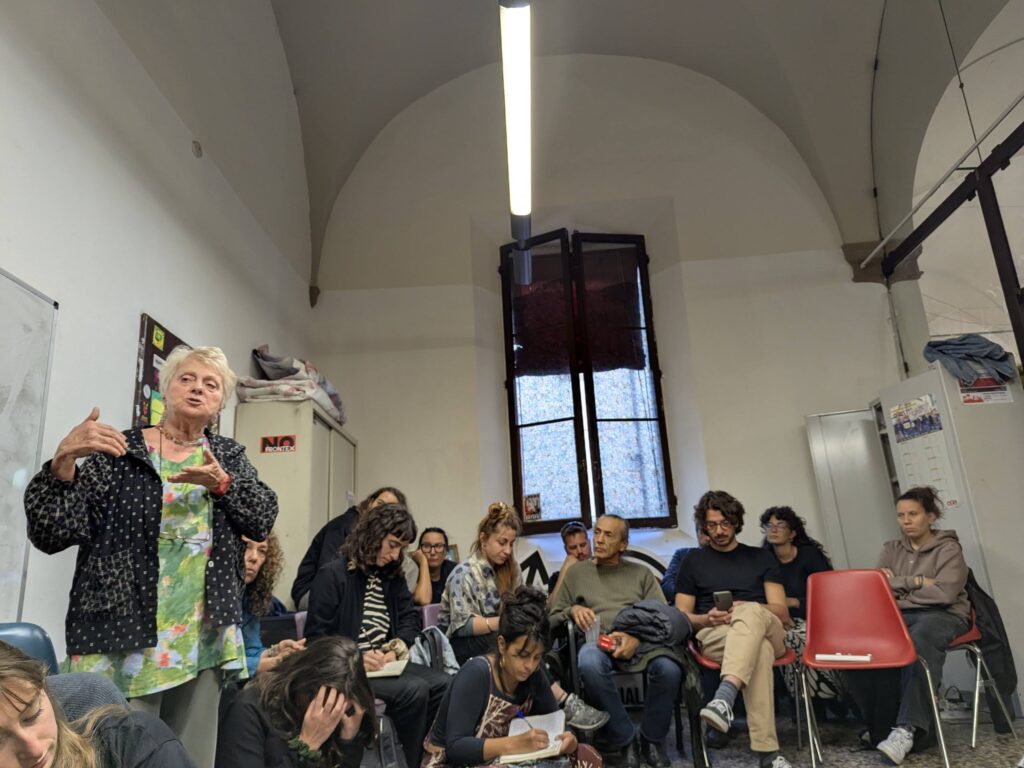
Day 2: Saturday 27 September 2025 – Afternoon Session
Working with Communities and Self-Organizing
This session explored fundamental questions about community formation, self-management, and collective identity within social clinics and across the international network. The discussion moved from intimate questions about who constitutes a clinic’s community to strategic questions about INOSC’s role as a transnational political subject.
Defining Community and Collective Identity
The session opened by questioning what constitutes a social clinic’s community and who belongs to it. KIA proposed two preconditions for community: a common space and a common need, plus “a space that allows its members to experiment with creative and unexpected directions.” However, the discussion quickly revealed tensions in how clinics understand community formation.
The challenge of inclusion: KIA noted a central concern that “incomers rarely get involved with the political actions of the social clinic,” suggesting that “the patient has internalised weakness and passivity.” This raised difficult questions about whether social clinics reproduce divisions between care providers and care recipients despite stated commitments to horizontal organizing.
Several participants addressed strategies for reducing hierarchies. A member from Freiburg explained that to eliminate hierarchy, “we go to meet people outside the clinic in their daily [lives] so they meet us as people not as medical specialists.” V2S described how before opening their clinic, they “went to the neighborhood and met people as people to understand what was needed, what it should have looked like.” Geko emphasised “constant reflection on how we operate to avoid a top-down approach. It’s a continuous deconstruction of power relations.”
Yet Caracol articulated the persistent contradictions: “When I encounter someone who comes in the clinic, I feel the ‘us and you.’ When I encounter one of the clinic [collective], I feel it’s an ‘us,’ a collective us. When I take to the street for a demo, I’m the ‘you’ for the city council that looks at me like the marginalised, scum that doesn’t wash herself. But when someone enters the clinic they don’t know that I’m a ‘you’ for a demo, they think I’m part of the ‘us’ of the institutions.” She insisted on making clear to people accessing the clinic that she struggles with similar issues, like being on waiting lists, and that “when I go to a demo I do it for me first and also for others, not for them. We live in a contradiction and that’s our starting point. But we need to start and move on.”
Brigata Basaglia acknowledged this reality more starkly: “We can’t eliminate the power between us and those who receive our service. But we need to reduce that power differential.”
Alternative framings: Azadi suggested moving beyond “community” to concepts like “making society, making collectivity, the common good, social alliances”. KIA offered a relational definition: “A community is not a bunch of people in a given space. A community depends on a set of relationships. We can discuss what kind of relationships. But the basis of discussion is how we come together and find a basic agreement in values, a basic agreement on needs and a basic agreement on practices to address these needs.”
Self-Management: Practice and Principle
The discussion of self-management revealed different understandings of its purpose and political meaning.
Self-management as prefiguration: KIA emphasised that “self-management is not just a principle, but a practice. And we have the conviction that it works, that’s why we consider it as an inspiring example.” They argued that social clinics “aim to show other people to self-organise. Experience the freedom you can have in a community like ours. It’s not about replacing the state, but encourage others to go and self-organise. Go find your subject and organise yourselves. We are more free in thinking in a social clinic because there is no boss to tell us not to do this or that.”
Another member from KIA built on this: “We show we can change more things than the state does on us. We can educate ourselves, we can change the way we do things. This becomes a political proposal. A suggestion to other people.”
Self-management as strategy: Veddel framed social clinics as “a real utopia, a living space, a laboratory. But also we need a strategy on how to multiply these laboratories not just leading by example.” He invoked Poulantzas to argue that “we as civil society we are part of the state. We can’t be outside.”
This prompted fundamental disagreement about the relationship between social clinics and state institutions. Mai argued that demanding from institutions “is not just asking as a child but it’s to make the institution accountable for what it’s supposed to provide. Otherwise we let them slip and get away with not fulfilling their duty.”
However, a member from KIA rejected this framing, citing Sartre: “The problem is how to turn a group of people waiting at the bus stop into a subject group sharing and acting together. I don’t want to see the state giving us things because it’s infantilising. That’s the position of children.”
Divergent Political Horizons
The most significant tension emerged around whether social clinics aim to make themselves obsolete by pushing for better state provision, or to build permanent alternatives to state healthcare.
The obsolescence position: Poliklinik – Solidarisches Gesundheitszentrum Leipzig expressed: “Our wish for the future is to make ourselves obsolete, to get to a point where healthcare is for everyone and our action is no longer needed.”
The transformation position: Microclinica proposed instead: “We’re building the day after. We don’t want just to become obsolete. We don’t want the state to do what we do. We want to do it. We want to manage it ourselves.” Caracol reinforced this: “Create a new society that can substitute the one that exists now. But it won’t be given to us. We have to take it. We must demand from ourselves that we want something else.”
Both acknowledged that “as a network it’s okay to remain different in our approaches,” suggesting that INOSC can hold these divergent political horizons in productive tension rather than requiring consensus.
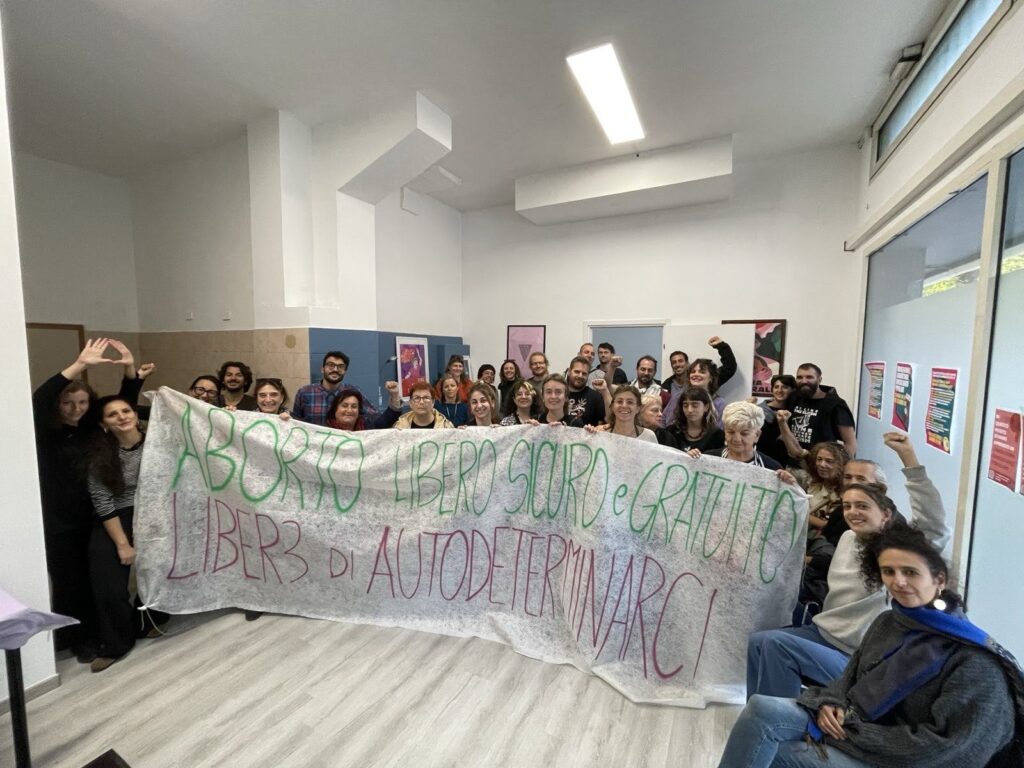
The International Network: What Are We Together?
The session addressed what binds INOSC across national contexts and political differences.
Foundation in mutual recognition: Participants noted that “INOSC was created through mutual recognition. Each clinic recognising themselves in the practices, values and perspectives of the others. At the same time we recognise the differences.” The primary difference identified was “the relation to institutions.”
Forms of solidarity: When asked what kind of relationship exists across the network, participants suggested “we can’t say we’re friends or comrades. We’re co-strugglers.” KIA explained their delegation model: “Delegation without decision-making power as direct democracy vs. a democracy of representatives. We here are delegates of KIA, just for the purpose of this meeting, time bound and strictly mandated from the general assembly.”
Networking strategies: Brigata Basaglia suggested “we should work locally, but politically we have to work together.” LSP proposed “making network between networks through networks,” acknowledging that INOSC functions as a meta-network connecting diverse local initiatives and broader movements.
Unresolved Questions
The session concluded without resolving fundamental tensions, but perhaps that was its achievement – making visible the political and strategic differences within INOSC while affirming commitment to continued collaboration
Concluding Observations
The 4th International INOSC Meeting in Bologna demonstrated both the network’s maturation and the complexity of building transnational solidarity in healthcare activism. Over three days, participants moved from concrete updates and practice-sharing through philosophical debates about community and self-management to practical questions about network organisation and future collaboration.
Several themes connected across the three days:
The question of power and hierarchy appeared in multiple forms – from medical professionals’ complicity in migration control, to divisions between care providers and recipients within clinics, to questions about INOSC’s own decision-making structures. Participants consistently acknowledged that power differentials cannot be simply eliminated but must be continuously examined and minimised.
Divergent relationships to state institutions emerged as INOSC’s primary political difference, with some clinics seeking to make themselves obsolete by improving public healthcare while others aim to build permanent alternatives. Rather than resolving this tension, the network affirmed that “it’s okay to remain different in our approaches.”
The dialectic between local rootedness and transnational solidarity ran through discussions. Participants emphasised that clinics must work locally, embedded in specific territorial struggles, while “politically we have to work together” – building what Giulia called “network between networks through networks.”
Concrete next steps included developing communication infrastructure, coordinating specific campaigns (particularly around militarisation and migration), resource sharing, and preparing for the 2026 meeting in Hamburg, Germany.
Perhaps most significantly, the meeting itself enacted the values participants articulated – creating space for disagreement and complexity while maintaining solidarity, privileging collective discussion over individual presentations, and treating three days of intensive dialogue as necessary labour for building the relationships that enable ongoing collaboration.
